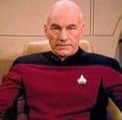Show

:"Captain Picard. There's a subspace message for you from Starfleet command. It's on [dramatic pause] a secure channel."

Show

:"A secure channel?!? What could be so important?"

Show

:"Good question, number one. Let's just hope it doesn't delay our rendezvous at Rigal 7. Lieutenant Worf, I'll take it in my ready room."

Show

: Generates a 256 bit public key, exchanges public keys over subspace, calculates a session key, checks validity of web certificate "Handshake protocol complete. Connection is secure."

Me: "Computer, log into Proton Mail."
Computer voice acted by Majel Barrett: "Proton Mail connection establish. Please enter user name and password."
Me: enters user name and password
Computer voice: "Warning, this connection is not secure. Hackers may be able to intercept your private information."
Me: "Computer, establish a secure connection."
Computer voice: "Unable to comply. A secure connection requires level 4 or above access."


I imagine that in 87, UHF was pretty newish. Having more than 6 TV channels must have been pretty grand, and I guess people were starved for entertainment. I'm sure that networks gave much less of a fuck because they didn't have to. I personally don't like local sports, but people like my dad probably got into it because it was regular and new entertainment. No wonder people drank a lot back in the day.
I think it was more of a cultural shift in what was expected from TV stories. Lynch really took a step forward with Twin Peaks. Back in the early 90s if you missed an episode of a show you were never going to see it again. There was no internet, there was no way to get hold of an episode once it aired unless you could find someone who had taped it on actual, literal tape. As a result the general wisdom was every episode had to be self contained. Otherwise people who missed an episode would be lost and unable to follow the narrative. Lynch said "fuck it" and gave Twin Peaks a plot anyway. It changed the game - People watched diligently, and if they missed an episode they made their friends or co-workers explain what had happened in detail to keep up.
When X-files introduced it's season-long overarching plots they were interspersed with the "monster of the Week" episodes. A couple of times during the season you'd get a plot episode that moved the overall plot forward. Again, this worked very well. The overarching plot helped create real stakes for the characters that never existed in previous shows where each episode was totally self contained. The status quo could change, people could get hurt, there could be important revelations. Again, it worked very well (and it didn't hurt that David Duchovny and Gillian Anderson were widely regarded as the hottest people on the planet with a great dynamic on the show) and helped shift what studios thought was possible and desirable in TV.
Aside from goofy holodeck adventures and filler, the TNG "effort" episodes mostly focused on some particular concept or idea the writers wanted to explore or play with. It was for the most part very episodic and often had a lot of slice of life scenes following the characters as they explored the universe. A few years later we got Deep Space 9 and Voyager, both of which were much more plot focused. DS9 famously so, and it's still recommended as a sci-fi political drama to this day. Babylon 5 also came out somewhere in the 90s and combined a plot driven narrative with what at the time was very impressive CGI for a TV series.